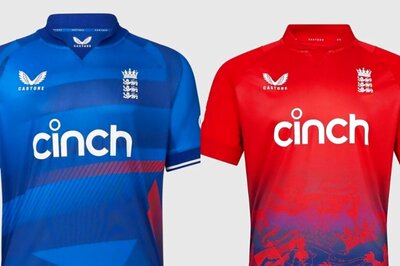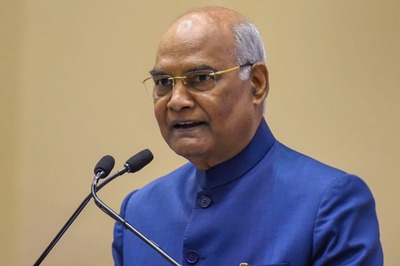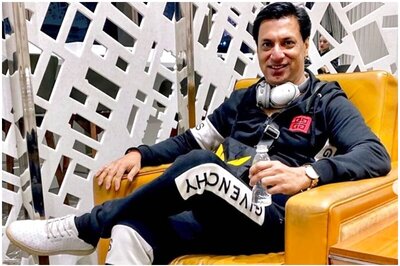
views
If there was any doubt over which way the DMK would go in the 2019 elections, MK Stalin, the president of Dravida Munnetra Kazhagam (DMK), dispelled all of it.
His maiden speech as president of the Dravida Munnetra Kazhagam, a post that he officially took up on August 28 and one that was clearly his for the taking after his father M Karunanidhi passed away, was a powerful attack on “communal forces” and a central government that he alleged was destroying “equality, social justice and rational thinking — the pillars of the Dravidian movement — with authoritarianism and communalism”.
While he spared no mercy for the ruling AIADMK dispensation in Tamil Nadu and called it “spineless and corrupt”, the crucial political import of his address, in the context of the 2019 parliamentary elections, is his opposition to the central government and a pledge to defend secularism. This needs to be read as the DMK reiterating itself as a firm member of a secular coalition, one which has the Congress as an integral part.
This is also not a mere political tirade against the ruling dispensation in New Delhi. It was taking an ideological and moral position. The crux of it is to portray and establish the DMK as the custodian of Dravidian ideological values and project Hindutva and the BJP as a threat to the core of the ideology that has defined Tamil Nadu politics over the last six decades.
Further, in his speech Stalin suggested that the ruling AIADMK dispensation had no “self-respect” and had buckled to the Centre. This way he wishes to create a situation where the DMK becomes the sole custodian of Dravidian legacy and in an electoral context the custodian of self-respect of the Tamils and pride of the state.
Stalin’s allegation gains political strength in the backdrop of the fact that the AIADMK has not had a strong leadership after J Jayalalithaa passed away in 2016. A perception has also been created that the ruling AIADMK faction in Tamil Nadu, under Chief Minister E Palanisamy, has buckled to the Centre, almost entirely.
The conjuncture one would draw is that Stalin’s ideological position is to help build and lead a coalition of parties in Tamil Nadu under the secular umbrella. This could also be construed as the DMK’s realisation that it would be risky to go into an election on its own and an alliance is necessary at the state and national level.
His father, the late M Karunanidhi, was a master at forging alliances. But the DMK, virtually under full Stalin control, went on its own in the 2016 Tamil Nadu Assembly elections. The end result was that the party could not wrest the state from the AIADMK. This only reiterates the need for an alliance.
While Stalin has his party firmly under his grip, his ability to emerge as the leader of an alliance is yet to be proven. Taking an ideological position is aimed at sending out a message that he can be the leader of an alliance in the State. He needs the alliance arithmetic to get a sweeping victory, like his father achieved in 2004 when the DMK-led alliance won all 39 parliamentary seats in the state and thus heralding the Congress-led UPA to power at the Centre.
Tamil Nadu, by the sheer fact that it has 40 parliamentary seats along with Puducherry, has been a key deciding state in any coalition government at the Centre. The fact that the Narendra Modi juggernaut had swept to power with a clear majority in 2014 meant the Dravidian parties had little say in New Delhi.
In effect, MK Stalin has projected himself as the most powerful leader in the state, which observers may argue he is given the control he has over his party. In fact, his speech is that of a confident leader and not one that revealed any insecurity.
He firmly sent a message to even his elder brother and former Union minister MK Alagiri, who opposed Stalin’s succession, and said he has grown from the grass roots of the party and recounted statements made by his late father asserting him as the successor.
MK Alagiri, for the moment, is not seen as a threat to Stalin as he does not have much of a hold over the DMK organisation. At this stage, Stalin is seen categorically as the leader of the party.
In fact, his speech exuded that confidence and even touched upon the deep core of Dravidian rationalist ideology when he explained that “we may be atheists, but we respect the belief of those who worship gods”.
The son has certainly risen firmly in the party of the rising sun, but his challenge would be to match his extraordinary maiden speech as president with political maverick and create an alliance that will help the DMK sweep 2019 and then an assembly election, scheduled for 2021.
That would be his real test and one where he needs to beat not just seasoned political adversaries and Prime Minister Narendra Modi, but also superstars of Tamil cinema — Rajnikanth and Kamal Haasan!
(Author is a senior journalist. Views expressed are personal.)




















Comments
0 comment